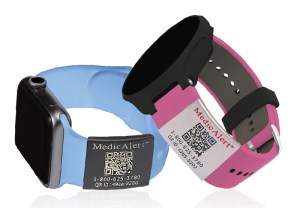
And Away We Go: Tips for Traveling with A Chronic Medical Condition
It’s summertime, when the possibilities for travel and adventure seem as endless as the long, sunny days. But sometimes, traveling with a chronic medical condition can feel overwhelming. It doesn’t have to be.
The keys are planning and preparation. If you do your homework before your trip, you can take away a lot of the stress and uncertainty. We’ve gathered tips from experts to address all your travel-related concerns.
Having a chronic medical condition shouldn’t stop you from experiencing the joy of travel. Use these tips, and the sky’s the limit for travel fun.

What is a chronic medical condition?
A medical condition is considered chronic when symptoms last longer than three months to a year, require ongoing medical attention or monitoring, and affects activities of daily living. In many cases, chronic conditions are life-long. Common chronic conditions include: arthritis, asthma, cancer, diabetes, heart disease, epilepsy, pulmonary disease, and mental health conditions. Individuals often live with multiple chronic conditions at the same time. Even though a single condition might require lifestyle adjustments to accommodate symptoms and treatments, it doesn’t mean that your traveling days are over.
General travel preparation
A bad day with a chronic condition might make even a trip across town seem overwhelming, let alone a trip across the country. But remember that any travel, near or far, requires some advance planning. For those managing chronic medical conditions, a little extra preparation will minimize risks and discomfort and maximize safety and fun. Here are some tips to help you have the most relaxing travel experience possible.
Air travel

- Inform your airline, cruise line, or other travel provider ahead of time if you need to travel with oxygen or other medical equipment. Find out about their security screening and boarding processes for your equipment. You can easily print your MedicAlert health profile to communicate your medications and medical conditions that may require consideration as you go through TSA security.
- For domestic travel, you can pack your meds in pill or solid forms in any amount as long as they go through security screening, and you are not required to notify security.
- Medically necessary liquids and creams can also be carried with you. If the amount exceeds 3.4 oz., remove it from your carry-on bag to be screened separately by airport security.
- Most common medical items, such as crutches, insulin and insulin tests, CPAP machines, and EpiPens may be kept with you as carry-ons.
- If you have vision or mobility issues or use a mobility aid, it’s advisable to call the airline in advance. That way, you can make sure assistance is provided for the entirety of your experience, from drop-off to baggage claim and pick-up.
- If your air travel crosses time zones, speak with your practitioner prior to your trip for advice to adjust your regular medication times.
Road trips
Plan frequent rest stops and breaks to manage fatigue and discomfort.
- Map out and research where you’ll be stopping, and make sure those places will be suitable to accommodate your specific needs.
- Prepare your vehicle to be as comfortable as possible, considering temperature and ventilation. Bring extra cushions and foot support if needed.
- Equip your vehicle with a first-aid kit including essential medical supplies, a printout of your MedicAlert digital health profile with your emergency contact information, or store a Smart Medical ID card in your wallet or glove box for easy access in an emergency.
- Bring along food and drinks that will satisfy any dietary requirements for your condition, especially if you have dietary restrictions or need to take medications with food.
- If anyone on your trip is non-verbal or has complex medical needs, consider a bright red seat belt ID holder to alert first responders. You can tuck a copy of your digital health profile or a Smart Medical ID Card in the ID holder for easy access to critical health information.
Packing medications and medical devices
Organize your medications using an organizer or travel pouch that fits easily into what you carry.
- Pack the amount of medication you’ll need for the duration of the trip, and then a few days extra in case of travel delays or other disruptions.
- Tuck a printout of your MedicAlert digital health profile in your suitcase in case of emergency. It contains your medical conditions, current medications with dosages, allergies, emergency contacts both personal and medical, vaccination records, and more.
- It’s recommended to pack liquid medications in zip lock bags in case of leakage.
- If medications need to be refrigerated, bring extra zip lock bags and ice packs. If the duration of your travel is longer than an ice pack will last, you can always use ice to keep medications cold. Check with your hotel or other accommodations ahead of time to make sure refrigeration will be available.
- When traveling internationally, the CDC recommends keeping medications in their original containers, or having a written statement from your doctor about the need for a specific medication.
- For international travel, keep in mind that regulations about traveling with medications vary greatly from country to country. Many countries allow you to bring a 30-day supply of certain medications.
- Some common medications are illegal in some countries
- Pack a travel health kit with more of your medicines and supplies than you think you’ll need, including wound dressings and spare batteries for medical devices. Before your trip, research the closest pharmacy to where you’ll be staying and confirm that you can replenish medical items there if necessary.
Partner with your practitioners
Schedule an appointment with your healthcare practitioner(s) for 4-6 weeks prior to your trip.
- During the appointment, discuss where you’re going, how you’re getting there, and what you’ll do there, and ask for destination-specific advice and information.
- Obtain any necessary prescription updates, medications, vaccines, and updated medical documents. Also, if you have a digital health profile, update all online information prior to travel.
- Insurance companies often cover medication costs with a 30-day supply limit. If your planned travel will last longer than your medicine supply, talk to your practitioner and your insurance company about how you can get enough medicine for your trip.
- If your condition requires consistent pain management, work with your healthcare providers to ensure that you’ll have what you need for the entire time you’re away.
- Some destinations pose specific health risks and may require certain vaccines or medications. However, some vaccines and medications can be harmful when taken with other medications. Talk with your healthcare provider about your current meds and their contraindications before they prescribe any new meds for travel.
- If your doctor does prescribe medicine for you, take it as directed, ideally before travel so you’ll have time to work through any issues before you leave.
Emergency preparedness
A wearable ID and digital profile allows you to not only store all your prescription information, medical history, and emergency contact information, but also to print out, pack, and share that information with travel companions and family members.
- Plan as much as possible for the unexpected. Should a medical emergency arise while you’re away, you’ll be in a much better position to get the care you need. Research local healthcare facilities and emergency services at your destination.
- Get travel insurance in case your condition or symptoms require you to postpone or cancel your trip. Confirm that your condition is covered under the travel insurance policy.
- If you are traveling outside your home country, research whether your health insurance covers medical care abroad. In many destinations, travelers must pay out of pocket for medical and hospital expenses. Consider getting travel health and emergency evacuation insurance, particularly if your destination is off the beaten track.
- Pack a basic first aid kit, including emergency medications and medical supplies, and prescription and emergency contact information.
- Prior to your trip, print out your digital health profile and share information with your travel companions and tour operators – highlighting your medical conditions, emergency contacts and procedures that are specific to your condition.
Specific conditions

- Anaphylactic Allergies & Asthma: Communicate any dietary or environmental restrictions to your transportation providers (airlines, cruise lines) and accommodation providers (hotel or personal hosts). Check pollen and weather forecasts for your destination. Try to pre-plan meals and be prepared with your own food and drinks if you’re not sure what will be available. Always carry emergency medications like epinephrine or an inhaler.
- Cardiovascular Conditions: Be mindful of fluid and sodium intake. Make sure to bring and take medications. Long trips by car or plane can increase the risk of blood clots, so be sure to stand and stretch when possible and, if necessary, wear compression stockings.
- Cognitive Conditions: For conditions like Alzheimer’s and Autism, the most important precaution is minimizing wandering risks, as being in unfamiliar surroundings can increase stress and wandering. Make sure individuals with these conditions always have identification with them. Bring along several familiar, meaningful personal objects to help reduce stress. Discuss and, if possible, practice travel scenarios such as airport security ahead of time, and try to create and maintain familiar routines while you’re away from home.
- Diabetes: Managing diet and insulin levels is key. As with food allergies, try to develop a food plan prior to travel. Make sure to bring supplies for glucose monitoring and develop an emergency plan in case of insulin spikes.
- Lupus: Since this is an autoimmune disorder, you’ll want to minimize exposure to germs by wearing an N-95 mask and using sanitizer and frequent hand-washing while traveling. Research beforehand how much walking and physical activity will be involved, especially outside. Photosensitivity can trigger lupus flare-ups, so make sure you have plenty of sunscreen and other sun protection, as well as the medication you take for flare-ups.
- Mobility Issues: Research and plan for accessible transportation, accommodations, and sightseeing options. Find out if mobility devices are provided or can be rented at your planned locations, or if you’ll need to bring your own. Leave extra time to arrive at activities and build some down time for rest into your travel schedule. Develop contingency plans in case the activities you planned are less accessible or more tiring than you thought.
- Multiple Sclerosis: Travelers with MS have different degrees of symptoms, from being asymptomatic to mobility impaired, so travel preparations will depend on your own level of symptoms. Since MS symptoms can be triggered by immunodeficiencies or other illnesses, follow the germ-avoidance strategies recommended for Lupus and other autoimmune conditions. As with other chronic conditions, be sure to pack extra medications, plan time for rest, and prepare contingency plans.
- Pulmonary Conditions: Before you travel, get detailed weather and air quality information for your dates and destination(s). If you regularly use oxygen, it’s critical to have an oxygen source planned and available for every stage of your travel. Contact transportation providers ahead of time to let them know you’ll be using oxygen. For details about preparing and traveling with different types of portable oxygen, visit here.
 Plan frequent rest stops and breaks to manage fatigue and discomfort.
Plan frequent rest stops and breaks to manage fatigue and discomfort. Organize your medications using an organizer or travel pouch that fits easily into what you carry.
Organize your medications using an organizer or travel pouch that fits easily into what you carry. Schedule an appointment with your healthcare practitioner(s) for 4-6 weeks prior to your trip.
Schedule an appointment with your healthcare practitioner(s) for 4-6 weeks prior to your trip. A wearable ID and digital profile allows you to not only store all your prescription information, medical history, and emergency contact information, but also to print out, pack, and share that information with travel companions and family members.
A wearable ID and digital profile allows you to not only store all your prescription information, medical history, and emergency contact information, but also to print out, pack, and share that information with travel companions and family members.

